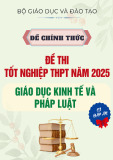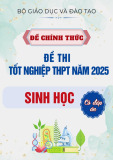
ĐỀ THI MẪU ÔN THI TN-THPT NĂM 2011 – ĐỀ 7
Question 1:Choose the best answer A,B,C or D which is suitable to finish the reading passage.
Are some people born clever ?and others..1..stupid ?or is intelligence developed by environment
or..2..experiences? Strangely enough the answer is that..3..is given at birth, and no amount..4..special education
can make a genius out ..5..a..6..born with low intelligence. On the other.7..,a child who lives in boring..8..will
develop his intelligence less than the..9..who lives in rich and varied surroundings.Thus..10..limits of a person’s
intelligence are fixed at birth,but..11..or not he reaches those limits will depend..12..his environment. This view
now helped by most experts,can..13..supported in a number of ways.
It is easy to show that intelligence is something we are..14..with.If we take two unrelated people ..15..random in
the population, it is likely that..16..degrees of intelligence will be completely..17.. If on the other hand, we
take..18..identical twins, they will very likely be as..19..as each other. This clearly suggests that
intelligence..20..on birth.
A,1-born 2-on 3-intelligence 4-of 5-of 6-child / person 7-hand 8-environment / surroundings 9-
child / one 10-the 11-whether / if 12-by 13-be 14-born 15-at 16-their 17-different 18-two
19-intelligent 20-depends
B,1-born 2-by 3-intelligence 4-of 5-of 6-child / person 7-hand 8-environment / surroundings 9-
child / one 10-at 11-whether / if 12-on 13-be 14-born 15-the 16-their 17-different 18-two
19-intelligent 20-depends
C,1-born 2-by 3-child / one 4-of 5-of 6-child / person 7-hand 8-environment / surroundings 9-
intelligence 10-the 11-whether / if 12-on 13-be 14-born 15-at 16-their 17-different 18-two
19-intelligent 20-depends
D,1-born 2-by 3-intelligence 4-of 5-of 6-child / person 7-hand 8-environment / surroundings 9-
child / one 10-the 11-whether / if 12-on 13-be 14-born 15-at 16-their 17-different 18-two
19-intelligent 20-depends
Question 2:Choose the word in each group that has the underlined part pronounced differently from the rest.
1,a-cure b-picture c-lecture d-furniture 2,a-plow b-how c-cow d-row
3,a-enough b-cough c-though d-rough 4,a-clothes b-cloth c-both d-boat
5,a-rate b-late c-private d-date 6,a-student b-stupid c-study d-studio
7,a-few b-phew c-blew d-new 8,a-hard b-yard c-card d-carry
9,a-easy b-ear c-learn d-eat 10,a-page b-game c-go d-gift
Question 3:Read the following passage carefully then choose the best answer a, b, c or d.
Agriculture in the West and South of the United States has traditionally been supported by migrant workers who
migrate or move from area to area according to the crops that need harvesting. Many Chinese, Filipino, and
Mexican immigrants became migrant workers when they first arrived in the United States. Often they had
problems with the English language or skills that they could immediately use in the new country.
A person looking objectively at the living conditions of these workers might say that their way of life was little
better than slavery. They were housed in substandard conditions, received wages far below the minimum, and
had no medical or insurance benefits. The migrant workers had no labour unions that could bargain for better
wages, better hours, or improved working conditions. They had no money and no power with which to bargain
with their employers. Employers were making fortunes by the sweat of their workers’ brows. It took an idealistic,
determined young man named Cesar Chavez to change the plight of the migrant worker forever.
1,Which of the following correctly describes migrant workers ?
a-Only Mexicans were permitted to work on crops.
b, Living and working conditions were generally poor.
c-The workers usually stayed in one place for many years.
d-All the workers were fluent in English.
2, Which of the following correctly describes the work done by migrant workers ?
a-It required skilled labour.
b-It could only be done by native-born Americans.
c-It was closely surprised by national labour unions.
d-It was low paid, and working conditions were poor.
3,It can be inferred from the final sentence of the passage that

a-the conditions described are still the same today.
b-migrant workers will always live like slaves.
c-conditions for migrant workers are better now than before the work of Cesar Chavez.
d-there is no longer need for migrant workers.
4,The next paragraph of this passage will probably be
a-a history of agriculture in the United States.
b-a listing of the countries migrant workers come from.
c-a lesson in English as a foreign language.
d-the changes brought about by Cesar Chavez.
5, “plight” means: a-difficult conditions. b-poverty c-distress d-happiness.
Question 4:Rewrite these sentences, beginning as shown.
1,You can try to get Tim to lend you his car but you won’t succeed.
There is no point....................
2,What a surprise to see you here !
Fancy......................................................................................
3,We couldn’t relax until all the guests had gone home.
Only.........................................................
4,Galileo is considered to be the father of modern astronomy.
Galileo is regarded.........................
5,The last time it rained was a fortnight ago.
It.................................................................................
6,There is always trouble when he comes to visit us.
Whenever.....................................................
7,The doctor advised me to take a rest.
The doctor suggested........................................................
8,She didn’t say a word as she left the room.
She left......................................................................
9,You can use it as long as you like, and it won’t wear out.
No matter............................................
10,Tuberculosis and pneumonia are no longer incurable diseases.
No longer................................
Question 5:Choose the correct answer a, b ,c or d.
1,He found his book this morning, but now he...........his pen.
a-loses b-lost c-has lost d-had lost
2, “What’s the matter ?” + “The shoes don’t fit properly. They........my feet.”
a-have hurt b-is hurting c-are hurt d-will hurt
3,I.........you were here.
a-don’t know b-not know c-didn’t know d-wasn’t know
4,You may leave the classroom when you..........writing.
a-will finish b-are finishing c-have finished d-had finished
5,The foreign guests..........here almost a week.
a-have arrived b-have been c-have reached d-have got
6,.............you............a noise just then ?
a-Have...heard b-Were...hearing c-Did...hear d-Are...hearing
7,I’m sure I......her four years ago.
a-have seen b-saw c-had seen d-will see
8,She..........her lessons from seven to nine last night.
a-did b-had done c-was doing d-has been doing
9,My brother...........the Youth League since 1995.
a-joined b-has taken part c-is in d-has been in
10,I wonder if he..........the job.
a-takes b-will take c-would take d-has been

Question 6:Choose the best answer a, b, c or d to finish the following sentences.
1,This kind of medicine is quickly.......into the body.
a-entered b-absorbed c-gone d-introduced
2,The only.......to her house is across the fields.
a-access b-road c-means d-path
3,Bondi beach is........only from the sea.
a-explainable b-returnable c-stoppable d-accessible
4,It is impossible to.......why different people like different things.
a-account b-cause c-reason d-explain
5,The president will now.........the meeting.
a-talk b-speak c-say d-address
Question 7: Find the word which has the main stress syllable different from the others in each group.
1,a-realize b-improve c-possible d-comfortable
2,a-important b-especially c-refer d-influence
3,a-mineral b-example c-diamond d-popular
4,a-republic b-collector c-situation d-inscription
5,a-protection b-separate c-develop d-encourage
----------------------------------------------------The end !------------------------------------------------------------
Key test 7.
Question 1: D
Question 2: plow = plough / plau / cµy , xíi
1-a 2-d 3-c 4-b 5-c 6-c 7-c 8-d 9-c 10-a
Question 3:
1-b 2-d 3-c 4-d 5-a
genius [‘dʒi:niəs] thiªn tµi
objectively kh¸ch quan making fortunes [‘fɔ:t∫u:n] ph¸t tµi,ph¸t ®¹t
sweat må h«i brow / brau / tr¸n it take....... ph¶i cã.....
Question 4:
1,There is no point in trying to get Tim to lend you his car / to borrow Tim’s car.
2,Fancy seeing you here.
3,Only after all the guests had gone home could we relax.
4,Galileo is regarded as (being) the father of modern astronomy.
5,It hasn’t rained for a fortnight.
6,Whenever he comes to visit us there’s trouble.
7,The doctor suggested (that) I should take a rest.
8,She left the room without saying a word.
9,No matter how long you use it ,it won’t wear out. mßn,r¸ch
10,No longer are tuberculosis and pneumonia incurable diseases. lao,lao phæi
Question 5:
1-c 2-a 3-c 4-c 5-b 6-c 7-b 8-c 9-d 10-b
league / li:g / liªn hiÖp,liªn ®oµn
Question 6:
1-b 2-a 3-d 4-d 5-d
absorbe hót, hót thô (níc) ,l«i cuèn accessible only from: chØ cã thÓ ®Õn ®îc tõ...
access (n) [‘ækses] ®êng vµo The only access lèi duy nhÊt dÉn vµo
distress nçi ®au khæ ,nçi ®au buån,c¶nh hiÓm nghÌo
address ®äc mét bµi diÔn v¨n, nãi chuyÖn (víi mét ngêi / ®¸m ®«ng)mét ch¸ch trang träng
The president will now address the meeting: B©y giê chñ tÞch sÏ nãi chuyÖn víi héi nghÞ.
Question7:

1-b 2-d 3-b 4-c 5-b
1,a-‘realize b-im’prove c-‘possible d-‘comfortable realize [‘riəlaiz]
2,a-im’portant b-es’pecially c-re’fer d-‘influence
3,a-‘mineral (i) b-e’xample (a) c-‘diamond d-‘popular
4,a-re’public b-co’llector c-,situ’ation d-in’scription: c©u viÕt,c©u ®Ò tÆng
5,a-pro’tection b-‘separate c-de’velop d-en’courage separate [‘seprət]
develop [di’veləp]

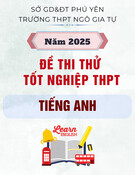

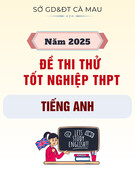
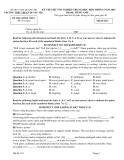
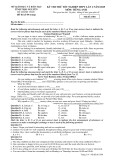
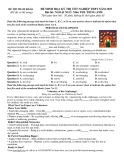
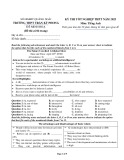
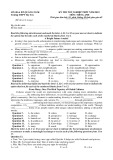
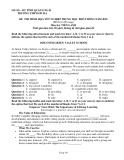
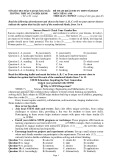








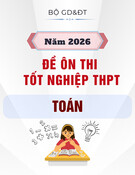

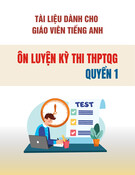
![Đề thi tiếng Anh tốt nghiệp THPT 2025 (Chính thức) kèm đáp án [mới nhất]](https://cdn.tailieu.vn/images/document/thumbnail/2025/20250627/laphong0906/135x160/9121751018473.jpg)

